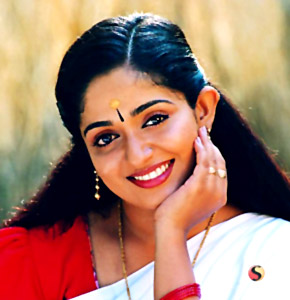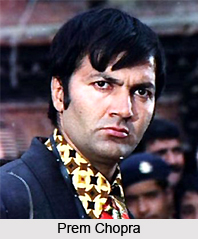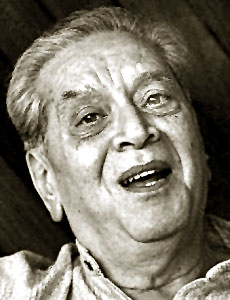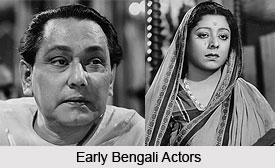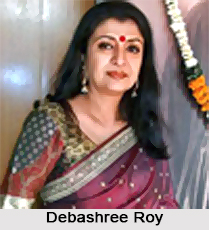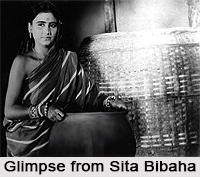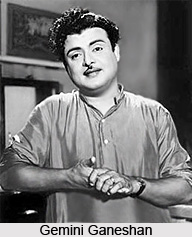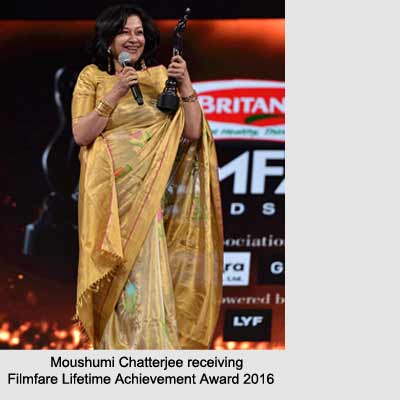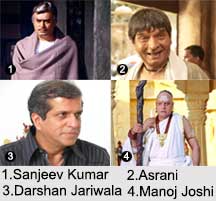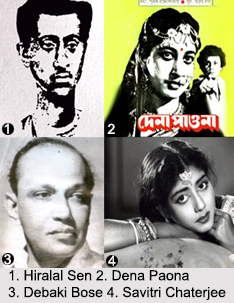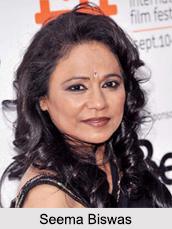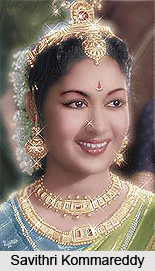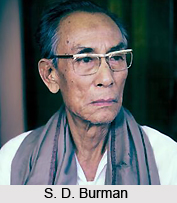 Sachin Dev Burman is also honorably known as Burman da, Kumar Sachindra Dev Barman, or S. D. Burman. This great music composer was born on October 1, 1906 and was considered as not only one of the most famous Bollywood music composers but also an all-time great Bengali singer and composer. His son Rahul Dev Burman was also immensely successful as a Bollywood music director. He was born in Comilla, British India, now in Bangladesh, to Nirmala Devi and Nabadwipchandra Dev Burman. S D Burman was the youngest grandson of `Ishanachandra Dev Burman`, Raja of Tripura.
Sachin Dev Burman is also honorably known as Burman da, Kumar Sachindra Dev Barman, or S. D. Burman. This great music composer was born on October 1, 1906 and was considered as not only one of the most famous Bollywood music composers but also an all-time great Bengali singer and composer. His son Rahul Dev Burman was also immensely successful as a Bollywood music director. He was born in Comilla, British India, now in Bangladesh, to Nirmala Devi and Nabadwipchandra Dev Burman. S D Burman was the youngest grandson of `Ishanachandra Dev Burman`, Raja of Tripura.
Sachin Dev Burman started his classical music classes under his father, who was a sitarist and Dhrupad singer. He did graduation from Calcutta University in Arts and his formal music-training starter under the supervision of famous musician, K. C. Dey. In 1932 he had his tutelage under Bhismadev Chattopadhaya. In future, he also took training from Kahifa Badal Khan, Sarangi player and Ustad Allauddin Khan.
S D Burman composed music for almost 100 movies, including numerous Bengali films. Some of his notable works are in the films like Agneepath (1990), Kalapani (1958), Amar Prem (1971) and others. Renowned singers like Mukesh and Talat Mahmood have also sung songs composed by him. S D Burman has sung a number of private songs and bhajans, the most popular are the "Dheere se jana bagiyan mein" and "Kaun nagariya javun re Bansiwale". He was also the singer of about 20 film songs, including Bengali films for which he composed music.
Sachin Dev Burman started to work as a radio singer on Calcutta Radio Station in 1932. Here, his work revolved around East Bengali and Tripuri folk music. He soon made a reputation for himself in folk and light classical music. During that time, it was strongly noticed that his film compositions were often influenced by his lovable folk-tunes from the Bengali, Bhatiali, Sari and also Dhamail traditions of Tripura Kingdom.
In 1932, Sachin Dev Burman`s first record was released under Hindustan Musical Product with "Khamaj". The record was semi classical, E Pathery Aaj Eso Priyo on one side and the folk Dakle Kokil Roj Bihane on the other. During the comind days, he reached his peak as a singer, composing as many as 131 songs in Bengali, and also sang for well-known composers like Himangsu Dutta, Nazrul Islam, RC Boral and Sailesh Das Gupta.
In 1934, he attended the All India Music Conference and presented his Bengali Thumri, in presence of Vijaya Lakshmi Pandit and the inimitable Abdul Karim Khan of Kirana Gharana. In the same year he was invited to Bengal Music Conference, Kolkata, inaugurated by Rabindranath Tagore and sang his thumri. Here, he was awarded a Gold Medal. He married Rabindranath Tagore`s student Meera Devi in the same year, their only child Rahul Dev Burman was born in 1939. His wife worked with him in some of the musical compositions.
S D Burman worked in Bengali plays, Sati Tirtha and Janani as a music composer. He gave brilliant music in Bengali films like, Protishodh (1941), Jevaan Sangini, Abhoyer Biye (1942), Chaddobeshi (1944) and others.
In 1944, he moved to Bombay and gave Sasadhar Mukherjee songs for two Ashok Kumar starrers, Shikari (1946) and Aath Din. However, his major break came the following year with the company`s Do Bhai (1947). The song Mera Sundar Sapna Beet Gaya sung by Geeta Dutt was her breakthrough song into the film industry. In 1950s, S D Burman came up with Dev Anand`s Nav Ketan Productions to create musical legends like Taxi Driver (1954), Nau Do Gyarah (1957), Paying Guest (1957), Munimji (1955) and Kalapani (1958). He also wrote music for the Guru Dutt classics, including the Pyaasa (1957) and Kaagaz Ke Phool (1959), along with the soundtrack of Devdas (1955).
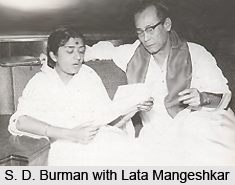 In 1957, S D Burman made up the team of Kishore Kumar, Asha Bhosle and lyricist Majrooh Sultanpuri and gifted the industry priceless duet songs. Later, Asha Bhosle became his daughter-in-law after she married Rahul Dev Burman. S D Burman`s thin yet powerful voice was often used by the directors for bardic commentary, as in Ore Majhi Wahaan Kaun hai Tera from "Guide" (1965), Mere Sajan Hai Us Paar Bandini (1963) and also Safal Hogi Teri Aradhana from Aradhana (1969), for which he was honored with the National Film Award for Best Male Playback Singer in1970.
In 1957, S D Burman made up the team of Kishore Kumar, Asha Bhosle and lyricist Majrooh Sultanpuri and gifted the industry priceless duet songs. Later, Asha Bhosle became his daughter-in-law after she married Rahul Dev Burman. S D Burman`s thin yet powerful voice was often used by the directors for bardic commentary, as in Ore Majhi Wahaan Kaun hai Tera from "Guide" (1965), Mere Sajan Hai Us Paar Bandini (1963) and also Safal Hogi Teri Aradhana from Aradhana (1969), for which he was honored with the National Film Award for Best Male Playback Singer in1970.
Due to ill health, S D Burman had to give away many hit films in late 1960s. In 1961, S D Burman and Lata Mangeshkar together did the recording of R D Burman`s first song for the movie Chhote Nawab (1961). Aradhana (1969) is considered to be a landmark score in the Bollywood history by S D Burman. More films that were proves of his excellence can include Tere Mere Sapne (1971), Abhimaan (1973), Sharmilee (1971), Prem Nagar (1974), Zameer (1974), Sagina (1974), Chupke Chupke (1975) and Mili (1975).
S D Burman went into coma soon after recording the song Badi sooni sooni, sung by Kishore Kumar for the film Mili. The nation lost this musical legend on October 31, 1975 in Bombay (now Mumbai).
S D Burman received the Sangeet Natak Akademi Award and Asia Film Society Award in the year 1958. In 1970, he was honored with the National Film Award for Best Male Playback Singer for the film Aradhana: Safal Hogi Teri Aradhana and BFTA award for Guide in 1966. The award of Filmfare Best Music Director Award was conferred to him twice, once in 1954 for Taxi Driver and the other in 1973 for Filmfare Best Music Director Award: Abhimaan.
Filmography of SD Burman -
| Film | Year | Film | Year |
| Rajgee | 1937 | Bandini | 1963 |
| Jakher Dhan | 1939 | Ziddi | 1964 |
| Jevaan Sangini | 1940 | Guide | 1965 |
| Protishodh | 1941 | Jewel Thief | 1967 |
| Abhoyer Biye | 1942 | Prem Pujari | 1969 |
| Chaddobeshi | 1944 | Aradhana | 1969 |
| Shikari | 1945 | Ishq Par Zor Nahin | 1970 |
| Aath Din | 1946 | Sharmilee | 1971 |
| Shabnam | 1949 | Naya Zamana | 1971 |
| Baazi | 1951 | Tere Mere Sapne | 1971 |
| Jaal | 1952 | Anuraag | 1972 |
| Baaz | 1953 | Jugnu | 1973 |
| Taxi Driver | 1954 | Chhupa Rustam | 1973 |
| Devdas | 1955 | Abhimaan | 1973 |
| Pyaasa | 1957 | Phagun | 1973 |
| Chalti Ka Naam Gaadi | 1958 | Prem Nagar | 1974 |
| Kaagaz Ke Phool | 1959 | Zameer | 1974 |
| Sujata | 1959 | Sagina | 1974 |
| Bambai Ka Babu | 1960 | Chupke Chupke | 1975 |
| Tere Ghar Ke Samne | 1963 | Mili | 1975 |







